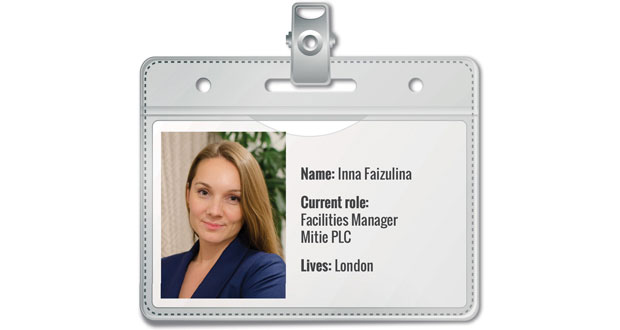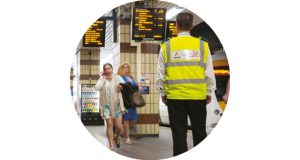Q: What first attracted you to working in FM, did you have much awareness of the profession?
There is a lot of discussion around FM not being a profession of choice. I can absolutely relate to this as when I applied for a secondment within a FM department as a Facilities Administrator around 10 years ago I had no idea what to expect. It turned out to be the perfect match for me – it’s fast-paced, varied, challenging and you never stop learning. Secondment turned into a permanent position, promotions and new opportunities. I’m yet to be convinced that there is another profession with the same reach across multiple disciplines. FM is far from being just about the buildings, it’s about people, technology, finance, business strategy – everything that makes a business.
Q: How did you progress through the profession to your current role?
I started in FM as a Facilities Administrator on a six-month secondment.
After five years I got offered a job as Senior Facilities Coordinator for a fast-growing business. They were rapidly expanding their property portfolio. The biggest challenge of the role was to build a function that would support the business from an FM perspective where it wasn’t even considered before. Being the most senior FM professional within the company I had an opportunity to drive all facilities related activities. I had to work hard and learn quick, which got me promoted to Facilities Manager.
During my time in FM I’ve worked for different companies, operating in different sectors, with different demographics, cultures and priorities. My role changed in terms of level, while my role as a FM also changes depending on the business I work for. The role evolves and I evolve with it.
Q: What have you found the most challenging experiences working in FM?
Perception of FM by other business functions. Although it has come a long way I still believe that sometimes as an industry we don’t do ourselves any favours. We need to work harder to change the perception of FM as a ‘handyman’ function to a professional services function by being more proactive, diverse, open minded and current. Diversity in FM may be the key to this. As a relatively young industry we seem to be lacking in diversity at all levels. This in turn limits how we are as an industry and how others see us.
Q: What have you found most satisfying about working in the sector?
The very tangible difference my work brings to the business and people within it, as the smallest of decisions and actions on my part can make a big difference to an individual and the company as a whole. The most recent example would be the increased provision of sanitation during the pandemic, where people feel safer and business’ reputation increased as a result.
Q: What qualities do you think are most needed for a successful career in FM?
Being organised, logical, decisive and fair are paramount in not just being successful but being effective in an FM role. Critical thinking, strong communication and leadership skills is what the FM industry needs for the future.
Q: What has changed about your job role since the COVID-19 crisis? E.g. home working, furloughed, redeployed?
The biggest change since the lockdown is having a building with much lower occupancy. Reactive tasks have reduced and the focus has been on catching up on planned maintenance and changes we need to make to keep less occupied buildings compliant and safe. We are getting to the stage where FM will need to review their offering in light of businesses deciding not to return to full occupancy any time soon, if ever.
Q: What is your organisation doing to ensure the wellbeing of staff – whether working at home or returning to the workplace?
FM is about physical assets, therefore a lot of roles in FM require a physical presence in the workplace. During the pandemic many changes have been made physically to the working environment, i.e. social distancing measures (via reduced occupancy), control of virus spread (via temperature monitoring), protective screens, signage and PPE. What I find quite positive is that not everything is about COVID, we still continue to work on other important areas like sustainability, process and systems improvements, and CSR.
Q: Do you believe the pandemic has highlighted the important role of the FM sector and what areas do you see as most key?
Suddenly businesses had to rely on FM to provide advice and solutions from the supply of necessary sanitation products and services, to reviewing property strategies. The key area was around the FM workforce, as for many organisations it’s FM staff who are at the front line, the ones who had to be present virtually and physically to support businesses through adapting to new ways of working. It wouldn’t be possible for the businesses to conduct their normal activities without the presence of FM staff. From supporting staff working from home with the provision of DSE to getting the offices ready for safe return. In addition to that businesses are looking to FM for solutions to make the most of costly property expenditure.
Q: What advice would you give to someone coming into the profession now?
FM is not all about being technical or having an engineering qualification. Transferrable skills can make you successful in FM, and might even give you competitive advantage. Soft skills are much harder to develop and if you’re a natural at people, organisational and critical thinking skills you may get better results in FM than a technical person lacking those skills. Invest time and energy into working on those skills.
Q: Which of your achievements are you most proud of during your career?
I’ve learnt about being resilient and facing up to the never-ending challenges of the job. I’m proud of how much I have grown as a person and a professional by constantly staying curious and willing to learn from people at any level within FM. My biggest hope for the industry is that we continue being a young industry i.e. we remain curious and willing to learn and don’t try to impose old thinking onto the newcomers by maintaining status quo.
Q: What do you predict could be the main changes to the FM sector post pandemic?
There will be a shift towards providing more flexible working environments whilst remaining safe. In light of the pandemic having more hygienic workspaces that can be adapted to an individual will become more of a thing. Business owners will start thinking whether their facilities infrastructure is up to standard to safeguard their employees from illnesses, for instance regarding fresh air supply, cleaning etc. I also believe and hope that it will force businesses into investing in innovative digital FM solutions, from occupancy sensors, automated workflows to highly advanced energy management systems. This in turn will mean a different kind of talent is needed within the sector – it’s both daunting and exciting.





